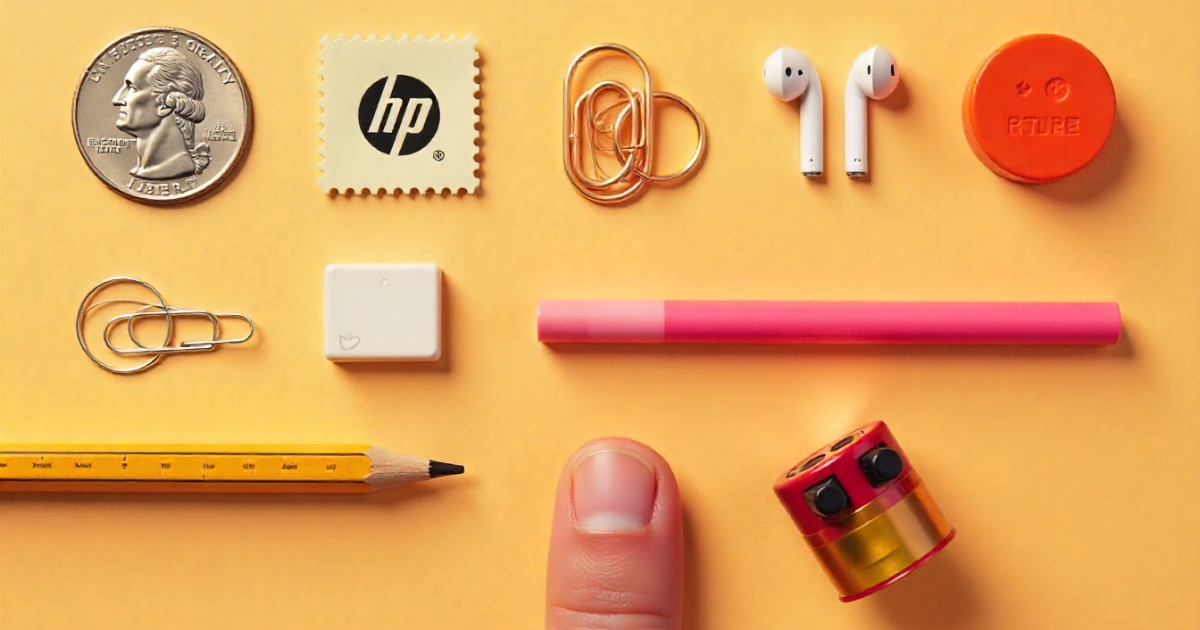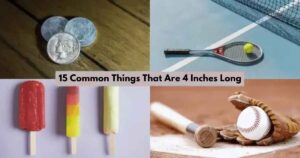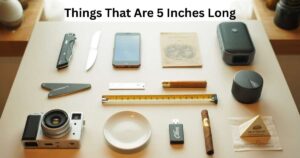Ever found yourself squinting at a ruler, trying to visualize exactly how long one inch really is? You’re not alone. One inch long might seem like a simple measurement, but it’s surprisingly tricky to picture without a reference point.
Here’s the thing: you’re surrounded by inch-long objects every single day. From the US quarter in your pocket to the HP keyboard control key under your fingertips, these everyday objects serve as perfect measurement references for quick measurements and daily tasks.
This comprehensive guide reveals eleven common items that measure exactly one inch, helping you master imperial measurement without constantly reaching for a ruler.
Whether you’re tackling home improvement projects, teaching kids about measurements, or simply satisfying your curiosity, these visual references will transform how you think about compact length and small scale measurements.
How Long Is 1 Inch
Understanding one inch long measurements starts with grasping the basics of imperial units. One inch equals exactly 25.4 millimeters in the metric system, making measurement conversions between systems straightforward.
The inch originated from the British system and remains a cornerstone of imperial measurement in the United States. Unlike the decimal measure approach of metric units, inches divide into fractions like 1/2, 1/4, and 1/8.
Visual Reference Points for One Inch
Your body provides excellent references for quick measurements:
- Adult thumb width: Approximately one inch across
- Index finger segment: From knuckle to tip measures roughly one inch
- Pinky finger width: Close to one inch for most adults
Measurement Conversion Quick Reference
| Unit | Equals 1 Inch |
| Millimeters | 25.4 mm |
| Centimeters | 2.54 cm |
| Feet | 1/12 foot |
| Yards | 1/36 yard |
Professional tip: When precision matters, always use proper measuring tools. These body references work great for fast estimations and routine work, but they vary between individuals.
Things That Are 1 Inch Long
The following everyday objects provide reliable visual references for one inch long measurements. Each item represents a different category, from monetary units to computing tools, ensuring you’ll always have a reference nearby.
These common items make imperial measurement accessible without carrying rulers everywhere. They’re perfect for daily tasks requiring prompt assessments and swift gauging.
1. Index Finger

Your index finger serves as nature’s built-in ruler for one inch long measurements. The width of an adult index finger typically measures between 0.75 and 1.1 inches, making it an excellent reference for quick measurements.
Gender differences affect finger measurements significantly:
- Men’s index fingers: Average 0.9-1.1 inches wide
- Women’s index fingers: Average 0.75-0.95 inches wide
Using Your Finger for Measurements
This compact length reference proves invaluable for everyday activities and routine work. Crafters, gardeners, and DIY enthusiasts rely on finger measurements for:
- Spacing plants in gardens
- Measuring fabric intervals
- Estimating small gaps in construction
- Quick cooking measurements
Important note: Your finger width remains consistent throughout your life, making it a reliable personal measuring tool for habitual actions and commonplace tasks.
2. A US Quarter Width

The US quarter diameter measures exactly 0.955 inches, making it virtually one inch long for practical purposes. This American coin serves as the most accessible measurement reference in the United States.
Why Quarters Work for Measurements
Currency references like the 25 cent piece offer several advantages:
- Standardized dimensions maintained since 1965
- Readily available in most situations
- Durable metal construction resists wear
- Consistent thickness of 1.75mm
Quarter Measurement Techniques
| Method | Best For | Accuracy |
| Single quarter | Small measurements | 95% accurate |
| Quarter stack | Longer distances | Very reliable |
| Edge rolling | Curved measurements | Good estimation |
The coin diameter makes quarters perfect for measurement conversions in daily tasks. Contractors often use quarters to check spacing between tiles, while seamstresses use them for button placement.
3. A Postage Stamp

Modern postage stamps in the United States typically measure 0.87 by 1.04 inches, putting them squarely in one inch long territory. The stamp size has remained remarkably consistent since the introduction of Forever stamps.
Stamp Dimensions Across Types
Different postal items offer varying measurement references:
- Forever stamps: 0.87″ × 1.04″
- Commemorative stamps: 1.0″ × 1.5″ (often larger)
- International stamps: Varies by country
- Vintage stamps: Generally smaller
Practical Applications
Adhesive stickers like stamps excel for small scale measurement needs:
- Craft projects requiring precision spacing
- Scrapbooking layout planning
- Educational activities teaching measurement
- Art projects needing consistent spacing
Historical context: Early American stamps measured differently, but modern standardization makes current stamps reliable measurement tools for routine artifacts.
4. HP Keyboard Control (Ctrl) Key

The HP keyboard control key measures approximately 1.0 by 0.5 inches, making its length a perfect one inch long reference. This computing key represents modern technology’s commitment to ergonomic standardization.
Keyboard Key Specifications
Digital tools follow strict manufacturing standards:
- Standard key width: 0.6 inches
- Ctrl key length: 1.0-1.1 inches
- Key height: 0.3-0.4 inches
- Key travel: 2-4 millimeters
Why Ctrl Keys Matter for Measurement
The shortcut key offers unique advantages for fast estimations:
- Always available at computer workstations
- Consistent sizing across manufacturers
- Durable construction maintains dimensions
- Tactile reference for blind measurements
Tech insight: Keyboard buttons underwent extensive ergonomic testing to achieve current dimensions. The one inch long Ctrl key balances accessibility with finger comfort during habitual actions.
5. A Paperclip

Standard paperclips measure exactly 1.0 inches in length, making them ideal tiny size references for office everyday activities. These ordinary objects represent one of the most consistent imperial measurement tools available.
Paperclip Size Variations
| Type | Length | Best Use |
| Standard | 1.0 inch | General reference |
| Jumbo | 1.97 inches | Larger measurements |
| Small | 0.75 inches | Precision work |
| Colored | 1.0 inch | Visual distinction |
Creative Measurement Uses
Paperclips excel beyond routine work:
- Chain measuring: Link clips for longer distances
- Curve tracing: Bend around irregular shapes
- Depth gauging: Insert into small spaces
- Spacing tool: Maintain consistent gaps
Office wisdom: Keep paperclips handy for instant sizing needs. Their compact length and flexibility make them superior to rigid rulers for many daily tasks.
6. AirPods

Compact earbuds like Apple AirPods measure approximately 1.21 inches in length, placing them close to one inch long measurements. These portable ear pieces represent modern miniaturization technology.
Earbud Dimension Comparison
Audio gadgets vary in size across brands:
- AirPods (1st gen): 1.21″ length
- AirPods Pro: 1.22″ length
- Samsung Galaxy Buds: 1.1″ length
- Generic earbuds: 0.9-1.3″ range
Why Earbud Measurements Matter
Mini headsets serve practical measurement purposes:
- Consistent dimensions across production
- High-quality materials maintain shape
- Widespread ownership ensures availability
- Precise manufacturing guarantees accuracy
Modern context: The rise of small headphones has created new measurement references. Their compact length makes them perfect for swift gauging in technology-rich environments.
7. A Standard Dice

A standard dice measures exactly 0.625 inches (5/8 inch) on each side, making it slightly smaller than one inch long but still useful for small scale references. Gaming cubes represent precision manufacturing in the entertainment industry.
Dice Manufacturing Standards
Board game pieces follow strict regulations:
- Casino dice: Precisely 0.750 inches
- Standard dice: 0.625 inches (5/8″)
- Mini dice: 0.375 inches (3/8″)
- Jumbo dice: 1.0+ inches
Gaming Precision Requirements
Game die accuracy affects gameplay fairness:
- Weight distribution: Perfectly balanced
- Corner radius: Consistent across all dice
- Surface finish: Smooth for fair rolling
- Dimensional tolerance: ±0.005 inches
Gaming insight: Square die production involves precision molding and quality control. Their tiny size demands exact measurements for tournament play and routine artifacts in gaming.
8. An Eraser or Rubber

The classic pink eraser measures 1.0 by 0.5 by 0.25 inches, making its length a perfect one inch long reference. These common items represent educational standardization across American schools.
Eraser Size Standards
Educational supplies maintain consistent dimensions:
- Pink Pearl erasers: 1.0″ × 0.5″ × 0.25″
- Gum erasers: Variable sizes
- Mechanical erasers: 0.2″ diameter
- Art erasers: Various specialized sizes
Classroom Applications
Erasers support measurement conversions learning:
- Visual fraction lessons: Demonstrate 1/4, 1/2 measurements
- Estimation practice: Compare to other objects
- Group activities: Standardized tools for all students
- Art projects: Spacing and proportion guides
Educational tip: Teachers use erasers for fast estimations during daily tasks. Their compact length makes them perfect manipulatives for routine work in mathematics education.
9. A Hockey Puck Height

An official hockey puck measures exactly 1.0 inch in height, making it a perfect one inch long reference in the vertical dimension. This sports equipment represents precision manufacturing in professional athletics.
Official Hockey Specifications
NHL standards demand exact measurements:
- Height: 1.0 inch (exactly)
- Diameter: 3.0 inches
- Weight: 5.5-6.0 ounces
- Temperature: Frozen before games
Manufacturing Precision
Hockey pucks undergo rigorous quality control:
- Vulcanized rubber construction
- Temperature resistance for ice play
- Bounce consistency across all pucks
- Dimensional accuracy within 0.005 inches
Sports insight: The one inch long height ensures consistent gameplay across all professional venues. Prompt assessments of puck condition happen before every game.
10. A Sharpener

Standard pencil sharpeners measure approximately 1.0 inch in length, making them excellent tiny size references for everyday objects. These routine artifacts combine functionality with measurement utility.
Sharpener Variations
Different types offer varying measurement references:
- Handheld plastic: 1.0″ × 0.75″ × 0.5″
- Metal classroom: 1.1″ × 0.8″ × 0.6″
- Electric desktop: Much larger
- Novelty shapes: Non-standard dimensions
Educational Value
Sharpeners support learning in multiple ways:
- Geometry lessons: Demonstrate 3D measurements
- Estimation skills: Compare sizes visually
- Fraction concepts: Show parts of inches
- Tool usage: Practical measurement applications
Classroom wisdom: Teachers rely on sharpeners for instant sizing demonstrations. Their compact length and universal recognition make them perfect for swift gauging activities.
11. A Bottlecap

Standard bottle caps measure 1.02 inches in diameter, making them virtually one inch long across. These everyday objects represent industrial standardization in beverage packaging.
Bottlecap Standardization
Manufacturing consistency ensures uniform dimensions:
- Standard cap: 1.02″ diameter
- Crown caps: Same size globally
- Twist caps: Slightly larger at 1.1″
- Specialty caps: Various sizes
Industrial Applications
Bottlecaps serve measurement purposes beyond beverages:
- Craft projects: Consistent spacing tools
- Educational activities: Counting and measuring
- Art supplies: Paint palette dividers
- Workshop use: Small parts organization
Industry insight: Bottlecap standardization emerged from routine work efficiency needs. The tiny size demands precision manufacturing for proper sealing and habitual actions like opening bottles.
Conclusion
These eleven everyday objects transform abstract imperial measurement into tangible, visual references you can access anytime. From the US quarter in your wallet to the HP keyboard control key at your fingertips, one inch long measurements surround you constantly.
Key takeaways for mastering quick measurements:
- Body references like finger width provide personal measuring tools
- Common items eliminate the need for rulers in many situations
- Standardized objects offer consistent measurement references
- Multiple references improve estimation accuracy
Practical Applications Summary
| Situation | Best Reference | Why It Works |
| Office work | Paperclip | Always available |
| Cooking | Index finger | Food-safe option |
| Shopping | Quarter | Portable currency |
| Crafting | Eraser | Precise dimensions |
| Technology | Ctrl key | Consistent across devices |
Master these references and you’ll never struggle with measurement conversions again. These tiny size champions prove that imperial units don’t require complex tools—just keen observation of the ordinary objects around you.
Start practicing with these compact length references today. Your improved fast estimations skills will enhance everything from daily tasks to professional projects. Remember: the best measuring tool is often the one inch long object already in your hand.
Frequently Asked Questions
What things are one inch long?
Quarters, paperclips, dice, erasers, stamps, sharpeners, bottlecaps, keyboard keys.
What is 11 in inches?
Eleven inches equals nearly one foot or ruler length.
What common item is 10 inches?
Standard dinner plates, iPads, small laptops, large smartphones measure.
What body part is 12 inches long?
Adult foot length typically measures twelve inches or one.









